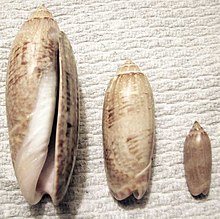Lettered olive


| Olive shell | |
|---|---|
| Scientific classification | |
| Kingdom: | |
| Phylum: | |
| Class: | |
| Subclass: | |
| Superorder: | |
| Order: | |
| Suborder: | |
| Infraorder: | |
| Family: | Olividae Ravenel
|
| Genera | |
|
Genus Oliva | |
Lettered Olive Oliva sayana grows to about 2 1/2 inches. It is a smooth, shiny, cylindrical-shaped shell with a short spire. The aperture is narrow and extending almost length of shell, continuing around the bottom and ending in a notch on the other side. Suture V-cut and deep. The lower part of whorl is just above where the suture extends outward and then at a sharp shoulder drops into the suture.
Coloration may vary from cream to a grayish exterior with reddish brown zigzag markings. This species is named for its dark surface markings that resemble letters.
Lettered olives habitat typically is in near-shore waters on shallow sand flats near inlets and occasionally to commonly washed onto ocean beaches, and ranging from North Carolina to the Gulf states.
It is a carnivore and it captures bivalves and small crustaceans with its foot and takes them below the sand surface to digest. Its presence is sometimes detected at very low tides by the trails it leaves when it crawls below the surface on semi-exposed sand flats.
Females lay floating, round egg capsules that are often found in beach drift. Young are free swimming. Colonists and early Native Americans made jewelry from these shells.
The shell of the lettered olive, Oliva sayana, is the state shell of South Carolina.
